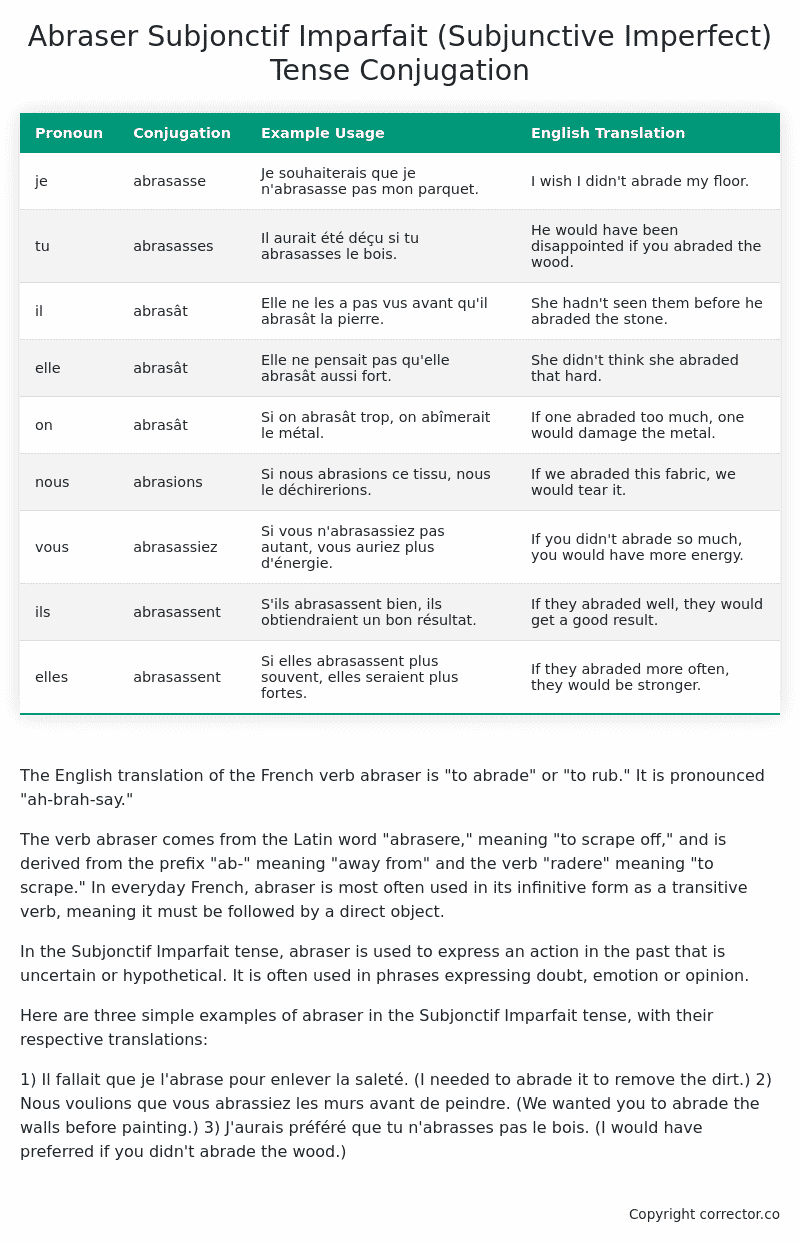Subjonctif Imparfait (Subjunctive Imperfect) Tense Conjugation of the French Verb abraser
Introduction to the verb abraser
The English translation of the French verb abraser is “to abrade” or “to rub.” It is pronounced “ah-brah-say.”
The verb abraser comes from the Latin word “abrasere,” meaning “to scrape off,” and is derived from the prefix “ab-” meaning “away from” and the verb “radere” meaning “to scrape.” In everyday French, abraser is most often used in its infinitive form as a transitive verb, meaning it must be followed by a direct object.
In the Subjonctif Imparfait tense, abraser is used to express an action in the past that is uncertain or hypothetical. It is often used in phrases expressing doubt, emotion or opinion.
Here are three simple examples of abraser in the Subjonctif Imparfait tense, with their respective translations:
1) Il fallait que je l’abrase pour enlever la saleté. (I needed to abrade it to remove the dirt.)
2) Nous voulions que vous abrassiez les murs avant de peindre. (We wanted you to abrade the walls before painting.)
3) J’aurais préféré que tu n’abrasses pas le bois. (I would have preferred if you didn’t abrade the wood.)
Table of the Subjonctif Imparfait (Subjunctive Imperfect) Tense Conjugation of abraser
| Pronoun | Conjugation | Example Usage | English Translation |
|---|---|---|---|
| je | abrasasse | Je souhaiterais que je n’abrasasse pas mon parquet. | I wish I didn’t abrade my floor. |
| tu | abrasasses | Il aurait été déçu si tu abrasasses le bois. | He would have been disappointed if you abraded the wood. |
| il | abrasât | Elle ne les a pas vus avant qu’il abrasât la pierre. | She hadn’t seen them before he abraded the stone. |
| elle | abrasât | Elle ne pensait pas qu’elle abrasât aussi fort. | She didn’t think she abraded that hard. |
| on | abrasât | Si on abrasât trop, on abîmerait le métal. | If one abraded too much, one would damage the metal. |
| nous | abrasions | Si nous abrasions ce tissu, nous le déchirerions. | If we abraded this fabric, we would tear it. |
| vous | abrasassiez | Si vous n’abrasassiez pas autant, vous auriez plus d’énergie. | If you didn’t abrade so much, you would have more energy. |
| ils | abrasassent | S’ils abrasassent bien, ils obtiendraient un bon résultat. | If they abraded well, they would get a good result. |
| elles | abrasassent | Si elles abrasassent plus souvent, elles seraient plus fortes. | If they abraded more often, they would be stronger. |
Other Conjugations for Abraser.
Le Present (Present Tense) Conjugation of the French Verb abraser
Imparfait (Imperfect) Tense Conjugation of the French Verb abraser
Passé Simple (Simple Past) Tense Conjugation of the French Verb abraser
Passé Composé (Present Perfect) Tense Conjugation of the French Verb abraser
Futur Simple (Simple Future) Tense Conjugation of the French Verb abraser
Futur Proche (Near Future) Tense Conjugation of the French Verb abraser
Plus-que-parfait (Pluperfect) Tense Conjugation of the French Verb abraser
Passé Antérieur (Past Anterior) Tense Conjugation of the French Verb abraser
Futur Antérieur (Future Anterior) Tense Conjugation of the French Verb abraser
Subjonctif Présent (Subjunctive Present) Tense Conjugation of the French Verb abraser
Subjonctif Passé (Subjunctive Past) Tense Conjugation of the French Verb abraser
Subjonctif Imparfait (Subjunctive Imperfect) Tense Conjugation of the French Verb abraser (this article)
Subjonctif Plus-que-parfait (Subjunctive Pluperfect) Tense Conjugation of the French Verb abraser
Conditionnel Présent (Conditional Present) Tense Conjugation of the French Verb abraser
Conditionnel Passé (Conditional Past) Tense Conjugation of the French Verb abraser
L’impératif Présent (Imperative Present) Tense Conjugation of the French Verb abraser
L’infinitif Présent (Infinitive Present) Tense Conjugation of the French Verb abraser
Struggling with French verbs or the language in general? Why not use our free French Grammar Checker – no registration required!
Get a FREE Download Study Sheet of this Conjugation 🔥
Simply right click the image below, click “save image” and get your free reference for the abraser Subjonctif Imparfait tense conjugation!

Abraser – About the French Subjonctif Imparfait (Subjunctive Imperfect) Tense
Formation
Common Everyday Usage Patterns
Interactions with Other Tenses
Subjonctif Présent
Indicatif Passé Composé
Conditional
Conditional Perfect
Summary
I hope you enjoyed this article on the verb abraser. Still in a learning mood? Check out another TOTALLY random French verb conjugation!


